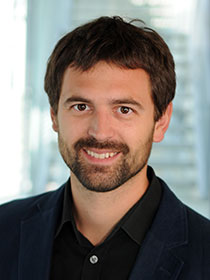Description
The reduction of green¬house gas emissions, most importantly CO2, has gained top priority in the worldwide agenda. Electrification of transport and renewable energies heavily rely on permanent magnets. Tailoring permanent magnets towards the specific needs of an application while reduce the content of critical elements is vital for the necessary expansion of green technologies. This project aims at the use of data-driven machine learning, to enhance the basic understanding of magnetization reversal and to facilitate inverse design of magnetic materials. Though prominently used in materials design for magnetic data storage and spin electronics, micromagnetic simulations are hardly scalable to address design questions of bulk materials. An alternative methodology for inverse design is the use of data-driven machine learning. Through assimilation of data arising from high-throughput measurements on combinatorial sputtered magnetic films and from micromagnetic graph networks models that predict hysteresis properties from chemical composition, structure, and processing conditions will be established. In the field of fluid dynamics and structural mechanics graph networks were found to speed up traditional simulations by orders of magnitude. Patterning the film structures give island of a size small enough to be treated with accurate micromagnetic simulations. Thus, data created by both experiments and simulation can be assimilated for the creating of robust and reliable machine learning models. The project will focus on tailoring the properties of (Nd,Dy,La,Ce)FeB magnets with a strongly reduced Nd and Dy content by changing chemical composition and exploring multiphase structures achieved by grain boundary diffusion.
News
During the RICAM Special Semester on Computational Methods for Electric Machines, held at the Johann Radon Institute for Computational and Applied Mathematics from October to December 2025, Harald Özelt was invited to speak at Workshop 4: Magnetic Material Modelling (November 24 – 28, 2025). His talk titled “Graph-Based Machine Learning for Microstructural Design of Permanent Magnets” focused on the integration of reduced-order models and graph neural networks for materials design, and demonstrated how uncertainty estimates can be used to assess the trustworthiness of predictions. This interdisciplinary workshop brought together experts in micromagnetics, multiscale modeling, and materials science to advance computational approaches for magnetic materials. Heisam Moustafa also presented his poster on “Graph Neural Networks to Predict the Hysteresis Curve of Hard Magnetic Microstructures”

On October 22, 2025, Heisam Moustafa presented his work on graph neural networks (GNNs) at the seminar of the Institute of Solid State Physics (IFP) at TU Wien, hosted by Christoph Eisenmenger. Later, on November 19, 2025, he gave another presentation at the Applied Machine Learning Seminar at the University of Vienna, organized by Lukas Exl. Both talks focused on leveraging GNNs for micromagnetic modeling and highlighted their potential for predicting key magnetic properties with improved accuracy and reliability.

On October 13, 2025, we published a new article “Graph Neural Networks to Predict Coercivity and Maximum Energy Product of Hard Magnetic Microstructures” in the Journal of Magnetism and Magnetic Materials (JMMM) with Heisam Moustafa as first author. This work summarizes the state of research within the DataMag project on applying graph neural networks (GNNs) to micromagnetism. The study demonstrates how GNN-based models can accurately predict key magnetic properties, paving the way for data-driven design of advanced permanent magnets. The full paper is an open-access publication and can be read without any restrictions: H. Moustafa et al., “Graph neural networks to predict coercivity and maximum energy product of hard magnetic microstructures,” Journal of Magnetism and Magnetic Materials, vol. 634, p. 173594, Nov. 2025, doi: 10.1016/j.jmmm.2025.173594.

The Magnetic Materials and Applications 2025 (MMA25) conference, organized by the UK Magnetics Society and held on 8 – 9 October 2025 in Kochel, Germany, provided a platform for bridging research and industry. Known for its strong emphasis on practical applications, MMA25 brought together experts from sectors such as automotive, energy, and manufacturing to discuss how advanced magnetic materials can meet real-world challenges. Harald Özelt was invited to give a talk on “Rare-Earth Lean Permanent Magnets: A Computational Design Approach”, demonstrating how simulation and machine learning can accelerate the development of sustainable magnet solutions for industrial needs.

From September 1 – 5, 2025, at the Trends in MAGnetism (TMAG) 2025 conference in Bari, Italy, Heisam Moustafa presented a poster titled “Graph Neural Networks to Predict the Hysteresis Curve of Hard Magnetic Microstructures”. His work introduced an innovative approach that combines graph neural networks (GNNs) with a Long Short-Term Memory (LSTM) layer to predict complete hysteresis curves. The LSTM component captures long-range dependencies by using specialized memory and gating mechanisms to determine which information should be retained, updated, or discarded, enabling accurate and efficient modeling of magnetic behavior.

Harald Özelt was invited to present his work at the 14th Joint European Magnetic Symposia (JEMS 2025), held in Frankfurt, Germany from 24–29 August 2025. In the symposium “Computational Magnetism and Machine Learning”, he delivered a talk titled “Combining Micromagnetics and Machine Learning for the Design of Rare-Earth Lean Permanent Magnets.” In his talk, Harald highlighted cutting-edge approaches that merge traditional micromagnetic simulations with modern machine learning techniques to accelerate the discovery and optimization of sustainable magnetic materials. He emphasized how computational design can reduce reliance on critical rare-earth elements while maintaining high-performance characteristics. Additionally, Harald served as chair for the Multiphysics and Multifunctional Materials poster session.

On July 31, 2025, Heisam Moustafa gave a talk at the 28th International Workshop on Rare Earth and Future Permanent Magnets and Their Applications (REPM2025) in Tsukuba, Japan, on the topic “Graph Neural Networks to Predict Coercivity of Hard Magnetic Microstructures”. He present the latest research on graph neural networks (GNNs) for magnetic materials. The model also incorporated prediction uncertainties, which indicate how reliable the respective forecasts are and how confident the machine learning model is in its results. This approach enables overall more robust and trustworthy predictions.
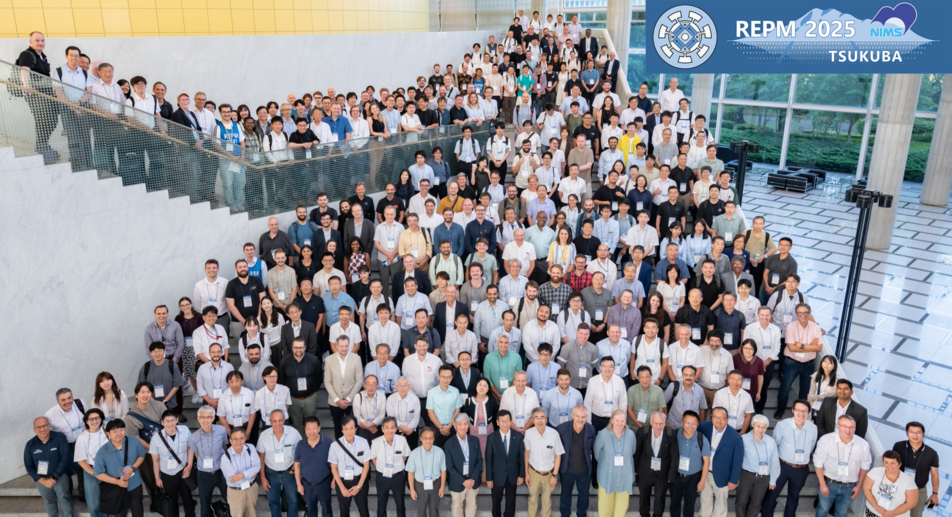
Harald Özelt was invited to speak at FisMat2025, held in Venice, Italy from 7 – 11 July 2025. In the special symposium “Advances on Permanent Magnets for Sustainable Solutions: Towards the European Green Deal”, he presented his talk on “Rare-Earth Lean Permanent Magnets Through Advanced Computational Design.” The symposium covered topics from the development of well-known rare-earth magnets to the design of novel rare-earth free materials with the potential to enable a partial substitution. The discussions spanned both experimental approaches and multi-level simulation perspectives.

From May 21st to 22nd 2025, Markus Gusenbauer, Alexander Kovacs, and Harald Özelt participated in the international workshop “Permanent Magnet Materials in the Making” at the Erich Schmid Institut (ESI) in Leoben, Austria. The event brought together researchers from Austria, Germany, Italy, Slovenia, and Spain to exchange insights on the latest developments in permanent magnet materials and explore future collaboration opportunities. In addition to project presentations and discussions, participants were also introduced to the card-based method as a tool for interdisciplinary engagement. Many thanks to the organizers, Andrea Bachmaier (WPI c/o ESI, ÖAW) and Erika Faigen (University of Vienna), for fostering such a productive and inspiring environment!

On April 7th 2025, our team participated in the international workshop “Data-driven Magnetic Materials Design and Optimization” in Vienna, hosted by the MaMMoS project and EMMC. The event brought together leading experts from academia and industry to explore advances in magnetic materials through data-driven approaches. We engaged in insightful discussions on multiscale simulation, data-sharing, and collaborative innovation. These exchanges sparked new ideas and valuable connections for our ongoing work.
The following day, we held a project meeting in Vienna with our partners from the Néel Institute, who had also attended the workshop.

On March 27th 2025, Heisam Moustafa presented our research at the Innovation Award 24/25 in Wiener Neustadt, showcasing our poster titled “Graph Neural Networks to Combat Climate Change – In Search of Clean Magnets.” The event, organized by accent and technet equity in cooperation with ecoplus/Technopol Wiener Neustadt, brought together innovators from academia and industry, sparking engaging discussions and an exchange of ideas.
During the IEEE AIM 2025 conference (February 9-12, 2025, Bressanone, IT), Leoni Breth presented her latest advances in the field of dimension-reduced modeling of permanent magnets: Reduced order micromagnetics of permanent magnets. The so-called Reduced Order Model (ROM) is used to generate training data for graph neural networks. To further improve this training data, the ROM is currently being expanded to include the mapping of soft magnetic defects in the microstructure. Initial results of a direct comparison with a full micromagnetic model show that realistic material properties of thick-film permanent magnets with dimensions in the range of a few 10 µm can be simulated in minimal computing time in the future.

From December 9th to 12th, 2024, William Rigaut and Pierre Le Berre from the Neel Institute visited Wr. Neustadt to discuss the recent progress of our DataMag project. The discussions centered on potential joint publications, explanations of the machine learning codes used for data analysis, and advancements in reduced-order micromagnetics. Further topics included the progress made on micro-patterning of magnetic films, the details of how measurements of microstructures would be conducted, and the subsequent comparison of those measurements with simulated stray field patterns.
From September 15th to 18th 2024, the 21st International IGTE Symposium 2024 on Computational Methods in Electromagnetics and Multiphysics took place in Graz, Austria. Heisam Moustafa participated in the Minisymposium on Micro-to Macroscopic Hysteresis Modeling and gave a presentation titled Predicting Coercivity Across Scales: Graph Neural Networks for Magnetic Structures. He presented his work on predicting the coercivity of hard magnetic microstructures using graph neural networks (GNN). Heisam explained the properties and analysis of the generated training data, elaborated on the architecture of the developed GNN, and evaluated its prediction accuracy.

From August 27th to September 6th 2024, Heisam Moustafa attended the European School on Magnetism (ESM) in York, UK, which is organized annually by the European Magnetism Association (EMA). The theme of the summer school was Magnetism for Energy-Efficient Devices. During the two weeks, courses were offered on the fundamentals, techniques, functions, and applications in magnetism. Additionally, there were tutorials and a poster session where Heisam presented his work on graph neural networks for hard magnetic microstructures (poster_ESM2024.pdf).

On 24. May 2024, the Lange Nacht der Forschung took place at various venues across Austria. Our research booth in Krems showcased how micromagnetic simulations and artificial intelligence can accelerate the discovery of eco-friendly, sustainable, and cost-effective permanent magnets (poster). Visitors actively participated in the research by drawing magnets with various phase distributions and crystal structures using felt-tip pens (poster). Our trained AI then analyzed their designs, predicting their potential performance. Through discussions, we emphasized the importance of magnet research for the green energy transition in the fight against climate change.
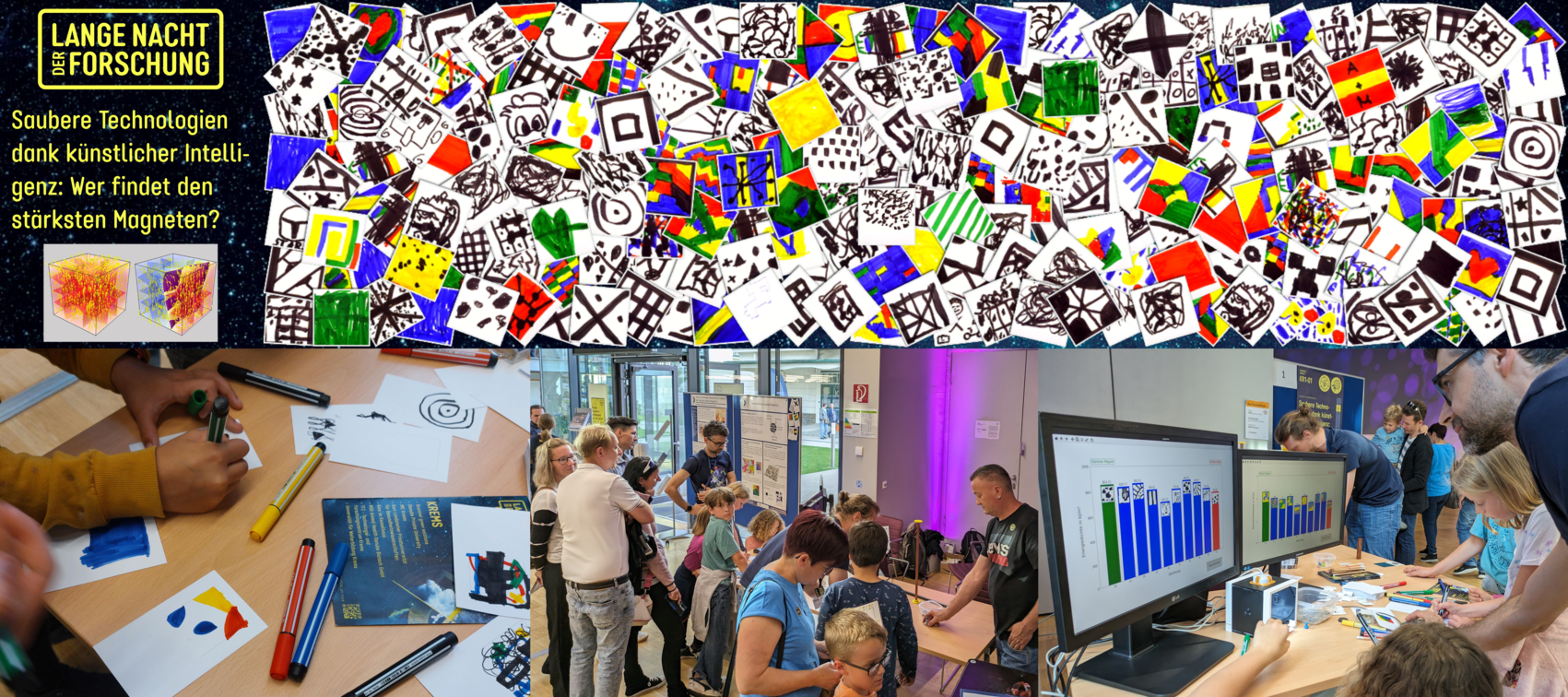
From May 5th to 10th 2024, the IEEE International Magnetics Conference INTERMAG 2024 took place in Rio de Janeiro in Brazil. Heisam Moustafa showed how we train and use graph neural networks to predict the coercivity of hard magnetic films. Training data was generated with our fast reduced order model and used to define the features of the nodes and edges of graphs. A correlation matrix is used to select important independent features and cross-validation was done to tune the number of training epochs.

In March 2024, Leoni Breth joined the project and focuses on modeling grain boundaries and defects in hard magnetic films for a reduced-order model. The current model has proven to be very useful for investigating large multigrain systems, as described in our latest publication. However, it relies on the assumption of ideal grain boundaries without defects. Leoni is actively working on enhancing the model to incorporate more realistic microstructures observed in the measurements conducted by our project partners.
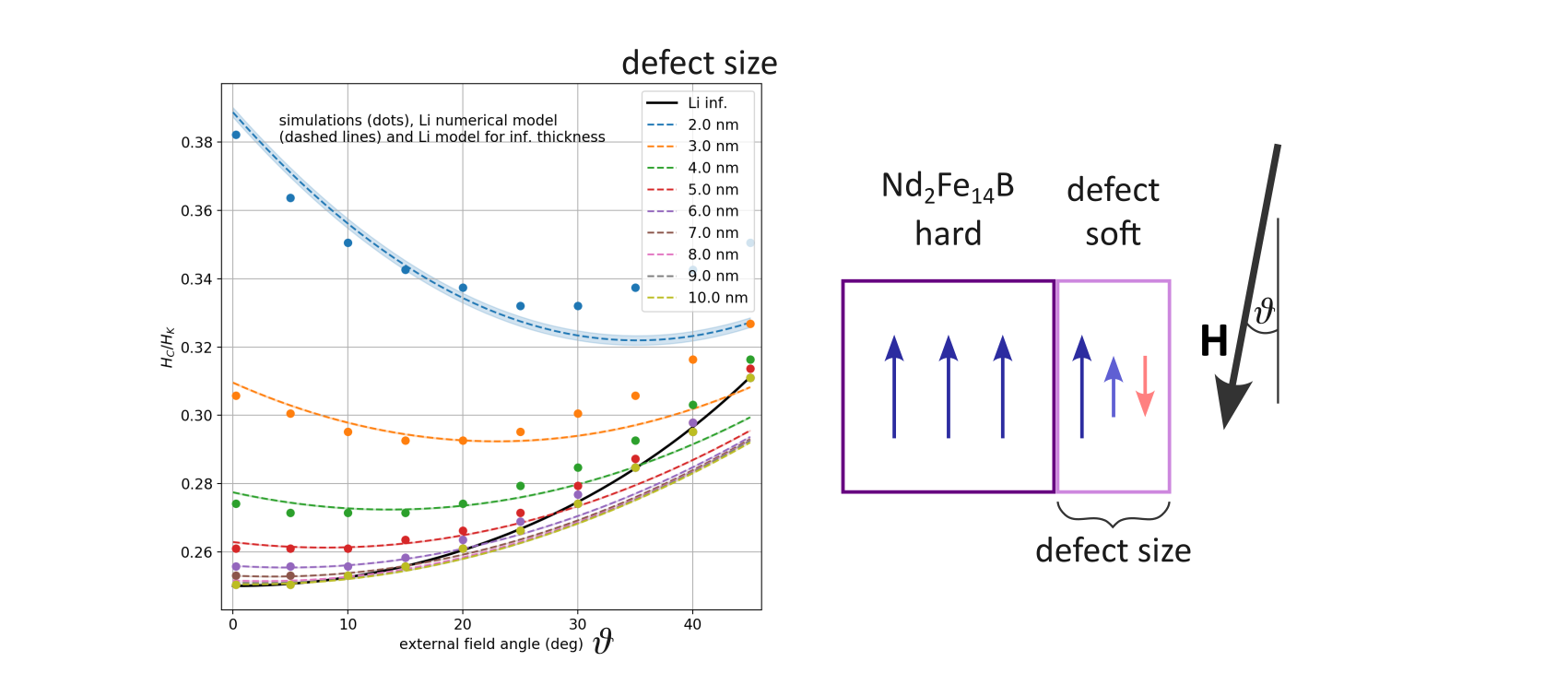
In February 2024 our article on Reduced order model for hard magnetic films was published in AIP Advances. In this paper, we explore microstructural parameters to enhance coercivity for large multigrain systmes. By leveraging a reduced order model based on the embedded Stoner-Wohlfarth method we are able to calculated macroscopic properties of magnetic materials on length scales not accessible to classical micromagnetic simulations. The full paper is an open-access publication and can be read without any restrictions: H. Moustafa et al., “Reduced order model for hard magnetic films,” AIP Advances, vol. 14, no. 2, p. 025001, Feb. 2024, doi: 10.1063/9.0000816.
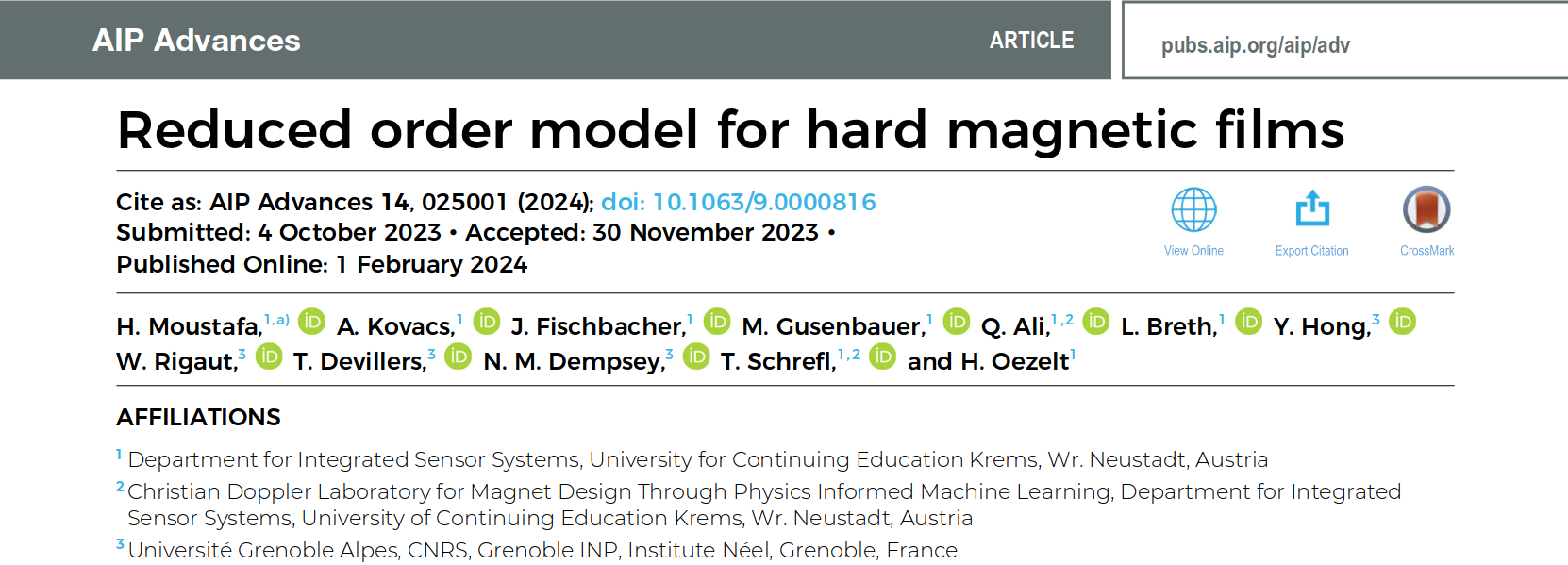
https://doi.org/10.1063/9.0000816
On January 8th 2024, we held a project meeting in Wr. Neustadt. Nora Dempsey, William Rigaut, Yuan Hong, Thibaut Devillers visited us at our department to discuss the recent progress of the project. The preliminary results of a trained graph neural network for hard magnetic films were presented. We evaluated the results, discussed the training data and identified important parameters for training. The implementation of periodic boundary conditions for the reduced order model was considered. The possibilities of fabrication and measurement of grain size and shape variations where reviewed.

From October 30th to November 3rd 2023, the 68th Annual Conference on Magnetism and Magnetic Materials took place in Dallas, Texas, USA. Heisam Moustafa presented our work on the fast computation of demagnetization of hard magnetic materials by using our developed reduced order model. He demonstrated the capabilities of the model by examining the influence of grain boundary thickness in hard magnetic films on the coercivity. Increasing distance between magnetic grains leads to higher coercive fields, possibly due to the diminished impact of the grains’ stray field.

From October 16th to 27th 2023, Heisam Moustafa visited the CNRS Institut Neél in Grenoble, France. The visit, hosted by our project partner Nora Dempsey, was used to gain insights into the various processes for synthesizing microstructured hard magnetic films. It was also an opportunity to familiarize oneself with measurement techniques such as MOKE (Magneto-optic Kerr effect), which are commonly used to characterize these materials. This two-week research stay facilitates the connection between theoretical insights and practical skills, enriching the researchers' expertise and contributing to the interdisciplinary nature of our joined project.

On September 28th 2023, we held an online project meeting. We discussed new high throughput measurement results by the Neel Institut of NdLaCeFeB filmes and how grain boundary thickness can be efficiently measured. The state of data analysis tools was presented and the employment of graph neural networks was discussed. Possible strategies utilizing cross section measurements and machine learning approaches to improve data analysis were developed.
On September 22nd 2023, we gave multiple workshops for school classes in the framework of the Forschungsfest Niederösterreich 2023. In the admission-free workshops called “Magnetism in Motion: Hands-on Electric Motor Workshop” students could not only learn about the role of strong magnets in electric motors and generators, but also build their own simple electric motor.

On July 17th, 2023, an interview with Harald Özelt was published on scilog, the magazine of the Austrian Science Fund FWF. The article delves into the application of artificial intelligence to optimize strong magnets for the energy transition. Harald elaborates on the team's goal to reduce reliance on rare earth elements while enhancing magnet performance for electric motors and generators. The interview highlights Harald's two projects, DeNaMML and DataMag, which explore the nanostructure of individual magnetic grains and their interactions in magnetic systems with various chemical compositions. The article garnered attention from other newspapers and platforms such as ORF, APA, Die Presse, Bild, Jungfrauzeitung, Studium.at, Salzburger Nachrichten, Nau.ch, resulting in various versions being published. The research team extends its gratitude to the Austrian Science Fund for providing a platform to showcase their research.
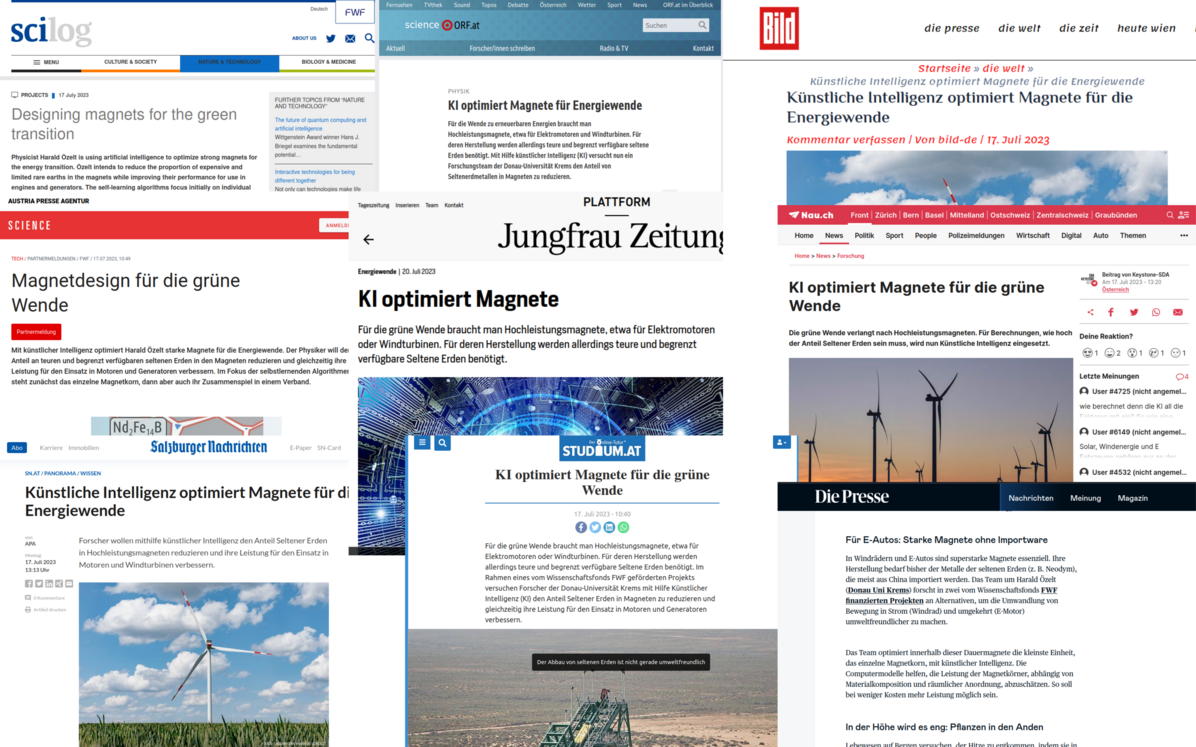
From June 19th to June 23rd, 2023, Heisam Moustafa attended the 16th Madrid UPM Machine Learning and Advanced Statistics Summer School (MLAS). He participated in the courses 'Bayesian Networks' and 'Neural Networks and Deep Learning'. Both courses aimed to deepen knowledge in these areas through theory and practical examples. This knowledge will be applied in the development of machine learning methods for magnet design.

On April 18, 2023, an online kickoff meeting took place. Yuan Hong, William Rigaut, and Nora Dempsey from the Néel Institute participated, along with Heisam Moustafa, Harald Özelt, and Thomas Schrefl from UWK. The discussions revolved around structural measurements and cross-sectional images of hard magnetic films. Parameters such as grain sizes and shapes for creating synthetic structures for simulation purposes were determined.
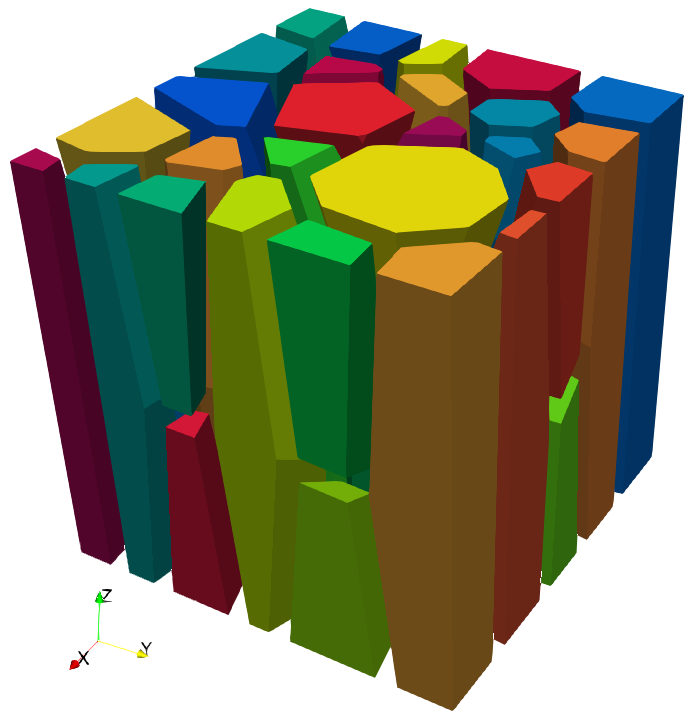
In mid-April 2023, Heisam Moustafa joined our center as a PhD student, focusing on micromagnetic simulations, reduced-order models, and neural networks. Prior to joining us, Heisam completed his Master of Science in Space Engineering at the University of Bremen and worked at ZARM TECHNIK AG in the field of magnetism and structural design.
Already at the end of September 2022, project partners from the Institute Néel of the Université Grenoble Alpes, Nora Dempsey and Yuan Hong, visited the Center for Modeling and Simulation in Wr. Neustadt. An early project meeting was held to coordinate the initial steps regarding the production of hard magnetic films and their characterization.
Details
| Duration | 01/03/2023 - 30/06/2026 |
|---|---|
| Funding | FWF |
| Department | |
| Principle investigator for the project (University for Continuing Education Krems) | Ing. Dr. Harald Özelt, MSc |
| Project members |
Team
Publications
Moustafa, H.; Kovacs, A.; Fischbacher, J.; Gusenbauer, M.; Ali, Q.; Breth, L.; Schrefl, T.; Özelt, H. (2025). Graph neural networks to predict coercivity and maximum energy product of hard magnetic microstructures. Journal of Magnetism and Magnetic Materials, Vol. 634: 1-11
Breth, L.; Fischbacher, J.; Schrefl, T.; Brueckl, H.; Kuehrer, S.; Pachlhofer, J.; Schwarz, M.; Weirather, T.; Czettl, C. (2025). Micromagnetic modeling of the cobalt binder structure in hard metals. In: Plansee Seminar, proceedings in 21st Plansee Seminar: 1, Plansee Seminar, Reutte, A
Moustafa, H.; Kovacs, A.; Fischbacher, J.; Gusenbauer, M.; Ali, Q.; Breth, L.; Hong, Y.; Rigaut, W.; Devillers, T.; Dempsey, N. M.; Schrefl, T.; Özelt, H. (2024). Reduced Order Model for Hard Magnetic Films. AIP Advances, Vol. 14, iss. 2: 025001-1 bis 025001-5
Lectures
Graph-Based Machine Learning for Microstructural Design of Permanent Magnets
RICAM 2025, 26/11/2025
"Rare-Earth Lean Permanent Magnets: A Computational Design Approach"
MMA 2025, 08/10/2025
Combining micromagnetics and machine learning for the design of rare-earth lean permanent magnets
14th Joint European Magnetic Symposia (JEMS) 2025, 27/08/2025
Graph neural networks to predict coercivity of hard magnetic microstructures
28th International Workshop on Rare Earth and Future Permanent Magnets and Their Applications (REPM2025), 31/07/2025
Reduced order micromagnetics of permanent magnets
IEEE Advances in Magnetics 2025 (AIM 2025), 10/02/2025
Predicting Coercivity Across Scales: Graph Neural Networks for Magnetic Structures
21st International IGTE Symposium 2024, Graz, Austria, 18/09/2024
Graph Neural Networks to Predict Coercivity of Hard Magnetic Microstructures
Intermag 2024, 08/05/2024
Reduced Order Model for Hard Magnetic Films
MMM 2023, 31/10/2023
Reduced Order Model for Hard Magnetic Films
68th Annual Conference on Magnetism and Magnetic Materials, 31/10/2023
